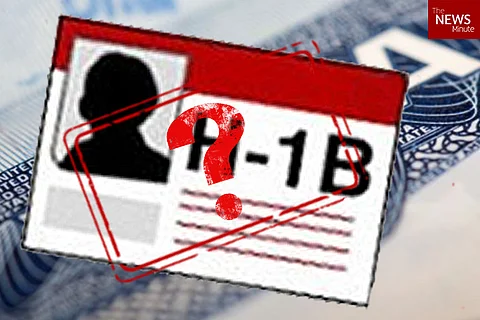

The US House of Representatives tabled a Bill on Tuesday that could potentially deliver a big blow to Indian IT firms. If the bill is passed, it would require a minimum annual salary of USD 130,000 for people to get hold of H1B visas, which is more than double the current minimum salary of USD 60,000.
The Bill is a part of President Trump’s new immigration policy and will make it tougher for Indian IT companies to send their professionals to the US and discourage American companies from hiring foreign workers. It will also impact Indians working in Silicon Valley as they might lose their jobs if they fail to meet the minimum salary criteria.
Soon after the potential legislation made the news, social media was flooded with a flurry of reactions. Most of them criticized the move, calling it the end of the ‘American dream’ for Indians.
Consultancies in USA offer you $60,000 initially. But the new rules of #H1B mandates minimum $100,000 which will fire many people
— Manishi (@endhuku) January 31, 2017
@chhabs H1B salaries are paid by home organizations. So doubling the minimum wage will discourage organizations to send folks in US +
— Amrita (@AalooPosto) January 31, 2017
The US dream suddenly died. #h1b #130k
— Nimisha Sharath (@Nim94Sha) January 31, 2017
@Geetu_Moza @BTVI If true, this can't be good. That's what a US national may earn with around 2-3 years of experience. Steep for H1B holders
— RG (@Rohit_FP) January 31, 2017
US Visa restrictions on h1B, students work restrictions are a huge opportunity for India. Can we rise up to the occassion?
— Chandru (@ChandrusWeb) January 31, 2017
Indian IT Engineers to Donald Trump on H1B #TrumpSarkar pic.twitter.com/KkpaZ5dq9b
— Chicken Biryanii (@ChickenBiryanii) January 31, 2017
One user expressed doubt as to whether the changed rules would apply to existing H1B visa holders as well.
Wonder if this applies to existing holders as well #h1b https://t.co/BwBT0dHifN
— Shyam (@shyamnaren) January 31, 2017
Some however, were more optimistic and said that this was an opportunity to bring back Indians to develop indigenous IT industry.
Undoubtedly a panic #h1b situation. But in the long run, we can see more people working for our country by staying in the country #JaiHind
— iShravan (@shravanonline) January 31, 2017
#H1B visa new rules can be big opportunity for #Makeinindia. If and only if central gov provides #opportunities, #Respect and #Platform.
— V shal Chavan (@V_shalchavan) January 31, 2017
@narendramodi could really take advantage of the #H1B visa issue to the country's advantage by bringing back the Indians for developing IT.
— Anoop Menon (@87anoopmenon) January 31, 2017
There were also questions about why Indian techies in the US were paid less, when they could be paid more.
@saranstm Indian employees in US working extra hours is the norm and the outsourcers bill for those hrs but do not pay their employees #H1B
— Saran Shanmugam (@saranstm) January 31, 2017
@saranstm I know of Indian employees in places like Stamford, Connecticut being paid $65k where $135K+ per year is the norm. #H1B
— Saran Shanmugam (@saranstm) January 31, 2017
@sri50 all is well if the firms pay more! why don't they pay us more? #H1B don't blabber, report properly.
— Chrisben (@superkingchris) January 31, 2017
H-1B Visa rules to be tightened. Oh no! Now our companies will have to sell software instead of people#h1b #H1Bvisas #TrumpDonald
— Shubham Parmar (@parmar_shubham) January 31, 2017
The stock markets took its worst plunge in several months after the proposed change in visa rules. All major IT companies like Infosys, TCS, HCL, Tech Mahindra etc have been severely affected.
Indians account for over 70% of H1B visa holders in the US, and in just 2016, over a million such visas were issued to Indians.
Earlier, Trump stirred controversy by imposing a travel ban from seven countries, all of them with Muslim majority population.
As a mark of protest against this travel ban, Twitter's live-streaming app Periscope updated its loading screen with a small text that reads "Proudly made in America by immigrants".
(With IANS inputs)